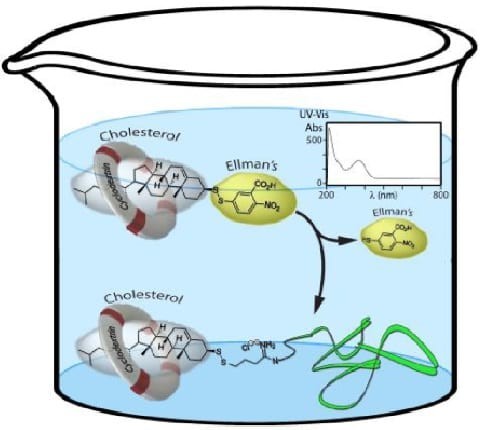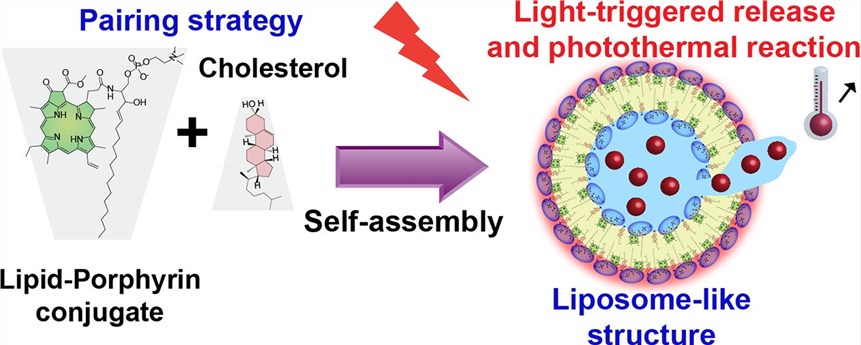Cholesterol Conjugation
Cholesterol is a neutral lipid that plays a crucial role in maintaining the integrity of biological membranes and serves as a precursor for the synthesis of many endocrine mediators. Conjugation of cholesterol moiety to active compounds for disease therapy or diagnosis is an attractive approach. BOC Sciences offers custom synthesis services for cholesterol conjugations.Our experts use standard chemical synthesis methods to conjugate cholesterol molecules to peptide, oligonucleotides, siRNA, polymers and antibody to improve their pharmacokinetic behavior, cellular uptake, target specificity and safety.
 Fig 1. Cholesterol-Polymers Conjugation. (Rasmussen, K. F.; et al. 2014)
Fig 1. Cholesterol-Polymers Conjugation. (Rasmussen, K. F.; et al. 2014)
Application of Cholesterol Conjugates
- Disease diagnosis
- Gene delivery
- Cancer cell growth inhibitor
 Fig 2. Lipid-porphyrin conjugate and cholesterol combination. (Massiot, J.; et al. 2022)
Fig 2. Lipid-porphyrin conjugate and cholesterol combination. (Massiot, J.; et al. 2022)
Our Cholesterol Conjugation Services
Synthesis of Cholesterol-conjugated Peptide
Conjugation of peptide lead compounds to cholesterol can facilitate the binding of peptide drugs to plasma proteins, thereby improving pharmacokinetics. Our peptide experts provide novel strategies for the synthesis of cholesterol-peptide conjugates that could be used for gene delivery and antiviral drug development.
Synthesis of Cholesterol-conjugated Oligonucleotides
Modification of oligonucleotides through conjugation is an effective way to promote their therapeutic applications and expand their development. Cholesterol conjugation of oligonucleotides is a widely used lipid conjugation method which greatly improves the biodistribution of conjugated oligonucleotides. BOC Sciences offers reliable services of cholesterol conjugation of oligonucleotides to achieve the optimized ligand-specific oligonucleotide uptake by selecting the best structural design strategy.
Synthesis of Cholesterol-conjugated siRNA
In the past two decades, siRNA has shown promising potential as a therapeutic agent. However, the drawback of siRNA is its low efficiency of delivery to target cells, which limits the application of siRNA drugs. One of the most powerful strategies for delivering siRNA to target cells is to covalently link siRNA to biomolecules. Combined with our expertise in modified nucleic acid synthesis, BOC Sciences can synthesize high quality cholesterol-siRNA conjugates that can be employed as a versatile siRNA delivery platform.
Synthesis of Cholesterol-conjugated Polymers
- Cholesterol-conjugated Polymer-based Photosensitizer
Photodynamic therapy is a promising approach to fight bacterial infections because it induces few side effects, does not generate resistance, and enables precise treatment. However, most photosensitizers (PSs) have disadvantages such as poor water solubility, severe self-quenching and potential toxicity. BOC Sciences provides custom service of synthesis of cholesterol-conjugated polymer-based photosensitizer. Our teams use cholesterol to conjugate to PSs by performing carboxyamine reaction or acylchloramine reaction with the application of cationic polymers.
- Cholesterol-conjugated Polymer-based Micelles
At BOC Sciences, our experts can synthesize cholesterol-conjugated poly(D,L-Lactide) (PLA)-based polymer micelles with larger hydrodynamic diameters and lower critical micelle concentrations (CMC), which can be used as a suitable delivery system for poorly soluble chemotherapeutic drugs in cancer therapy.
Synthesis of Cholesterol-conjugated Antibody
Cholesterol-antibody conjugate has become a general strategy to increase the potency of antiviral antibodies. The cholesterol-conjugated antibody shows increased antiviral potency through binding to lipid raft domains on the cellular membranes. Our experts offer a variety of cholesterol-conjugated antibodies by performing cholesterol conjugation at several positions, including variable and constant domains.
Frequently Asked Questions (FAQ)
Cholesterol can be conjugated with a variety of biomolecules, including peptides, oligonucleotides, siRNA, polymers, and antibodies. This versatile conjugation strategy is used to enhance the properties of these molecules, such as improving their biodistribution, cellular interaction, and solubility, thereby broadening their applications in scientific research and development.
Cholesterol conjugation improves the pharmacokinetic properties, cellular uptake, and target specificity of various biomolecules such as peptides, oligonucleotides, and polymers. By attaching cholesterol to these molecules, their membrane permeability and stability are enhanced, leading to improved overall efficacy in diverse applications like gene delivery and diagnostic processes.
Cholesterol conjugation significantly improves the biodistribution and cellular uptake of oligonucleotides and siRNA. By attaching cholesterol to these molecules, the conjugates are better able to penetrate cell membranes, leading to more efficient delivery to target cells. This modification enhances their stability and prolongs their circulation time in the body.


References
- Rasmussen, K. F.; et al. Cholesterol modification of (Bio)polymers using UV-Vis traceable chemistry in aqueous solutions. Macromolecular Bioscience. 2014. 14(1): 33-44.
- Massiot, J.; et al. Photo-triggerable liposomes based on lipid-porphyrin conjugate and cholesterol combination: Formulation and mechanistic study on monolayers and bilayers. Biochimica et Biophysica Acta (BBA) - Biomembranes. 2022. 1864(1): 183812.